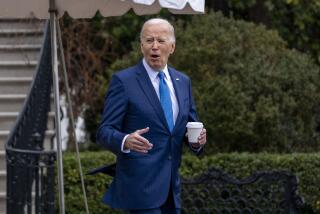Obama asks CNN’s Sanjay Gupta to be next surgeon general
President-elect Barack Obama has asked Dr. Sanjay Gupta to be the next U.S. surgeon general, looking to a popular television personality to help provide a public face for his healthcare agenda.
Best known as a health and medicine correspondent for CNN and CBS, Gupta, 39, is a practicing neurosurgeon in Atlanta and a member of the faculty at the Emory University School of Medicine.
The surgeon general oversees some 6,000 officers in the commissioned corps of the Public Health Service. Officers work as physicians, nurses, dentists and other health professionals in various federal agencies -- including the Centers for Disease Control and Prevention, the Coast Guard and the Bureau of Prisons.
Past surgeons general have wielded the most influence, however, by using the bully pulpit to focus attention on major health issues. And Gupta would come to the post with an unparalleled public profile and background as a communicator.
In 2003, while reporting on the invasion in Iraq, he was embedded with a Navy medical unit and performed brain surgery on U.S soldiers and Iraqi civilians.
More recently, Gupta -- the son of immigrants from India and Pakistan -- launched a nationwide campaign on CNN titled “Fit Nation” to highlight the dangers of obesity in children.
Obama’s transition office declined to comment publicly on the offer. But Gupta confirmed on his Twitter feed for CNN on Tuesday that he had been “approached.” The network, which has employed Gupta since 2001, reported that he is likely to accept the appointment.
CBS News President Sean McManus also said that he had spoken to Gupta about the offer. “If he decides to accept this job, I can’t think of a better person to do it,” McManus said in a statement.
Past surgeons general have been influential voices in national healthcare.
Dr. C. Everett Koop, for example, waged a high-profile campaign in the 1980s to spotlight the dangers of smoking. He also helped push the federal government to respond to the worsening AIDS crisis after years of silence from the Reagan White House.
And Dr. David Satcher, who served under Presidents Clinton and Bush, issued a ground-breaking report that highlighted the prevalence of mental illness and the stigmas attached to it.
The post also has generated substantial controversy during the last two administrations.
Clinton’s first surgeon general, Dr. M. Joycelyn Elders, was forced to resign after she told an AIDS forum in 1994 that masturbation was “natural and safe” and that “perhaps those facts should be taught in schools.”
Elders also enraged social conservatives with her outspoken advocacy for condom distribution and sex education in the schools as ways to combat the spread of HIV.
Bush’s last surgeon general, Dr. Richard H. Carmona, accused the administration of stopping him from addressing controversies such as stem cell research and contraception. The White House, which denied Carmona’s charges, has not filled the post since his term expired in 2006, relying instead on interim appointments.
Obama, who has made prevention a central focus of his push for healthcare reform, will almost certainly look to his surgeon general to advance that effort.
Chronic diseases linked to behaviors such as smoking and unhealthy diet are among the leading causes of skyrocketing healthcare costs.
The new surgeon general also could play an important role in pushing the kind of healthcare overhaul that Obama says he wants to pursue this year.
Gupta, who as a White House Fellow in 1997 served as special advisor to then-First Lady Hillary Rodham Clinton, has been promised a much higher-profile role and broader portfolio than past surgeons general, John King said on CNN on Tuesday.
“We are told that the pitch to him has been that healthcare reform will be a top priority,” King said, “that wellness, fitness, obesity, the issues he has focused on often here at CNN, will be a top priority.
“They have made the pitch to Dr. Gupta that he could help with the communications effort, travel the country, go on television, try to explain the arcane nature of healthcare policy to the American people much like he does on our network just about every day,” King added.
--
matea.gold@latimes.com
Christi Parsons in our Washington bureau contributed to this report.
More to Read
The biggest entertainment stories
Get our big stories about Hollywood, film, television, music, arts, culture and more right in your inbox as soon as they publish.
You may occasionally receive promotional content from the Los Angeles Times.







